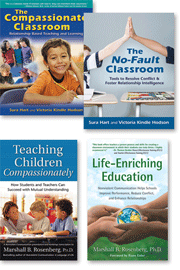Fostering Relationship Intelligence in the Classroom, continued
The world of the classroom is also all about relationships. And the quality of relationships in the classroom has everything to do with whether our students are thriving, or merely surviving. It also determines what our young people are learning about themselves and about the world in which they participate.
Relationships in the classroom, when tended, can teach students how to take good care of themselves and also how to care about others. When teachers give attention to classroom interactions and to developing relationship skills, students can learn to work well with others, solve problems together, sort out conflicts, and be leaders and peacemakers.
And if caring relationships are not cared about in the classroom, students will learn, on the playground or on the bus or someplace else, how to survive as best they can.
Having taught and observed for years in classrooms, we have seen that when teachers value Relationship Intelligence competencies as much as academic competencies they usually get the following results:
- Growing respect and care for one another
- Less conflict and more co-operation
- More engaged learning and academic achievement
In our first book, The Compassionate Classroom, we showed how taking time to establish safety and trust and nurture caring relationships at school is essential for learning to take place. And while many teachers complain they "have no time" for dealing with relationships, we see it as the fast-track to spending less time on behavior problems and more time on engaged learning.
One 3rd grade teacher of 15 years, weary of the amount of time she was spending managing behavior, and believing that the quality of relationships in the classroom held the answers, decided to start off the school year devoting the entire first month to activities to meet students' needs for safety and trust, belonging, connection, and building community.
They created a class vision of how they wanted their class to look, feel and function. And they worked on decorating the classroom together. They talked about needs they wanted to meet (safety, trust, learning, fun, friends, respect) and made Group Agreements to help meet those needs. They put on a play, and played community- building games.
Some people, including some parents, were worried that these students were losing precious learning time. However they came to see that spending time in this way led to students achieving far more than expected, and more than any of this teacher's previous classes.
Relationship Intelligence is a natural capacity we all have to engage power with each other for mutual well-being. It comprises a set of capacities that we are born with but that are rarely developed to the level of competencies. The ability to relate intelligently is deeply encoded in the DNA of human potential because our survival depends on it.
- Relationship Intelligence calls us to develop these four skills:
- To take responsibility an care for my needs
- To care about others' needs
- To value all needs equally
- To find strategies that can meet everyone's needs
In The Compassionate Classroom, we identify four primary relationships in the classroom: the teacher's relationship with him or her self; the teacher's relationship with students; relationships of students with each other; and students' relationship with themselves including with their learning. At the foundation of all the relationships in your classroom is your relationship with yourself.
We know that teachers and parents teach primarily by example, and secondarily by what they say, and through formal instruction. Children begin life with what Maria Montessori calls an "absorbent mind" and they continue to pick up cues from everything around them and especially from the adults who care for them.
When teachers develop their RIQ skills, the relationship intelligence quotient of students goes up markedly; instead of remaining a dormant "potential", it is activated. As well, the empowered actions of teachers with highly developed RIQ provide inspiration, encouragement and powerful modeling for students.
The real preparation for education is the study of one's self. - Maria Montessori
If you want to develop your RIQ, for your own growth and empowerment, and to benefit your students, we recommend the following practices:
Meet and greet your needs as they arise, moment to moment. To familiarize yourself with your needs, study Needs lists, sort through the Needs cards, check in with yourself throughout the day (and especially when feelings are strong): What needs are calling?
Take a weekly inventory of your needs to see: How well am I meeting my need for .... rest?... movement? .... nutrition? ... fun?... balance?... inspiration?... support?... empathy... self-acceptance? See what requests of yourself arise from your inventory.
By taking responsibility for your needs and doing your best to meet them, you not only empower yourself to live fully, but you bring an alive, authentic, open presence to your students.
Where your thought and attention goes, energy flows. Are your thoughts taking you where you want to go? Do negative thoughts about yourself stimulate unpleasant feelings and keep you in a rut? Or do your thoughts take you to more acceptance, self-compassion, self-regard, discovery and joy?
To change how you talk to yourself you can start noticing how you talk to yourself when you make a mistake. If you find yourself getting angry when you make a mistake, calling yourself names like "stupid" and "idiot", you are not only making yourself miserable, you are getting in the way of learning what the mistake could teach you.
An exercise from The No-Fault Classroom, "Learn from Real-Life Experiments", guides students and teachers in using The No-Fault ZoneTM Game Map and Needs Cards to explore a situation that didn't turn out the way you wanted.
The first step is to describe what happened, using Observation language, with no judgment. The next step is to sort through the Feeling Cards and lay down on the Map the Feelings up for you. Then sort through the Needs cards and lay down on the Map the Needs that motivated you in the situation. You can then lay down the Needs that were met by what you did. And then lay down the Needs that weren't met. In this way, you can sit with all of the Needs present in that situation, and then you can also consider what you might do differently next time.
We created The No-Fault ZoneTM Game to provide a visual Map for students and teachers to explore Inner Space together. On the Map you can: track where you are at any moment; take a read of your Feelings; recognize Choices that take you to The Fault Zone, and other Choices that take you to The No-Fault ZoneTM --that field "beyond ideas of right-doing and wrong-doing", where we have the most fun.
Exploring Inner Space with your students can be an exciting and fun journey. As you develop your Relationship Intelligence, we predict you will experience increasing enjoyment and delight within the world of your classroom, and beyond.
Sura Hart and Victoria Kindle Hodson have worked together for more than 20 years, developing and facilitating parent- and teacher-education workshops and materials. We have co-authored three books and created The No-Fault ZoneTM Game, a hands-on tool for learning and practicing clear, respectful, compassionate communication. Learn more or join their mailing list at www.k-hcommunication.com
Keep learning these vital communication skills with these books and training resources:




